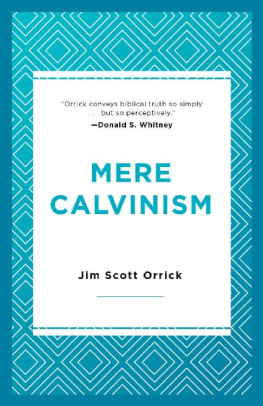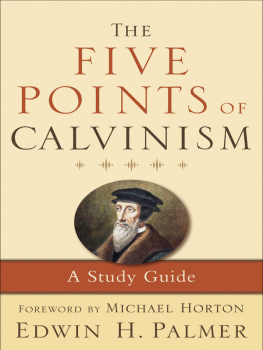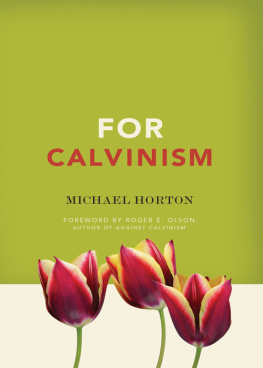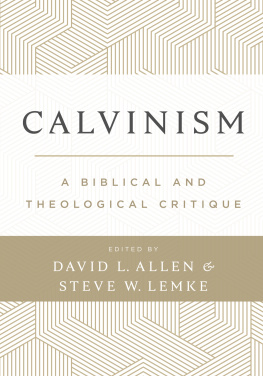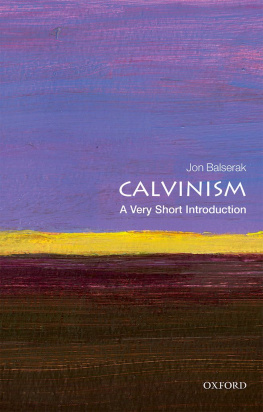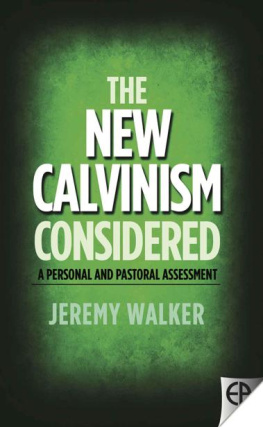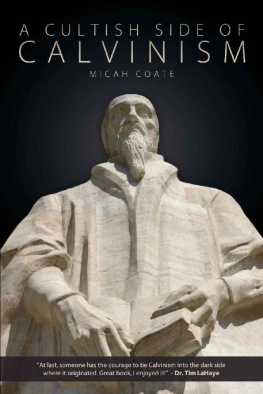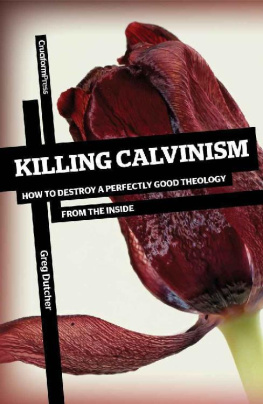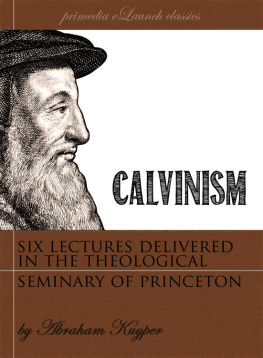Jim Scott Orrick [Orrick - Mere Calvinism
Here you can read online Jim Scott Orrick [Orrick - Mere Calvinism full text of the book (entire story) in english for free. Download pdf and epub, get meaning, cover and reviews about this ebook. year: 2019, publisher: P&R Publishing, genre: Religion. Description of the work, (preface) as well as reviews are available. Best literature library LitArk.com created for fans of good reading and offers a wide selection of genres:
Romance novel
Science fiction
Adventure
Detective
Science
History
Home and family
Prose
Art
Politics
Computer
Non-fiction
Religion
Business
Children
Humor
Choose a favorite category and find really read worthwhile books. Enjoy immersion in the world of imagination, feel the emotions of the characters or learn something new for yourself, make an fascinating discovery.
- Book:Mere Calvinism
- Author:
- Publisher:P&R Publishing
- Genre:
- Year:2019
- Rating:4 / 5
- Favourites:Add to favourites
- Your mark:
- 80
- 1
- 2
- 3
- 4
- 5
Mere Calvinism: summary, description and annotation
We offer to read an annotation, description, summary or preface (depends on what the author of the book "Mere Calvinism" wrote himself). If you haven't found the necessary information about the book — write in the comments, we will try to find it.
Jim Scott Orrick [Orrick: author's other books
Who wrote Mere Calvinism? Find out the surname, the name of the author of the book and a list of all author's works by series.
Mere Calvinism — read online for free the complete book (whole text) full work
Below is the text of the book, divided by pages. System saving the place of the last page read, allows you to conveniently read the book "Mere Calvinism" online for free, without having to search again every time where you left off. Put a bookmark, and you can go to the page where you finished reading at any time.
Font size:
Interval:
Bookmark:
CALVINISM
CALVINISM

Have any feedback on this book?
Write to P&R at with yourcomments.
Wed love to hear from you.
2019 by Jim Scott Orrick
All rights reserved. No part of this book may be reproduced, stored in a retrievalsystem, or transmitted in any form or by any meanselectronic, mechanical, photocopy,recording, or otherwiseexcept for brief quotations for the purpose of review orcomment, without the prior permission of the publisher, P&R Publishing Company,P.O. Box 817, Phillipsburg, New Jersey 08865-0817.
Unless otherwise indicated, Scripture quotations are from the ESV Bible (The HolyBible, English Standard Version), copyright 2001 by Crossway, a publishing ministryof Good News Publishers. Used by permission. All rights reserved.
Scripture quotation marked (NIV) is from the HOLY BIBLE, NEW INTERNATIONAL VERSION.NIV. Copyright 1973, 1978, 1984 by International Bible Society. Used by permissionof Zondervan Publishing House. All rights reserved.
Scripture quotations marked (KJV) are taken from the King James Version.
Italics within Scripture quotations indicate emphasis added.
Printed in the United States of America
Library of Congress Cataloging-in-Publication Data
Names: Orrick, Jim, 1960- author.
Title: Mere Calvinism / Jim Scott Orrick.
Description: Phillipsburg : P&R Publishing, 2019.
Identifiers: LCCN 2018046293| ISBN 9781629956145 (pbk.) | ISBN 9781629956152 (epub)| ISBN 9781629956169 (mobi)
Subjects: LCSH: Calvin, Jean, 1509-1564. | Calvinism.
Classification: LCC BX9418 .O69 2019 | DDC 230/.42--dc23
LC record available at https://lccn.loc.gov/2018046293
To my uncle, Paul A. Orrick
1. Calvinism
More Than the Five Points
2. Total Depravity
We Have Received a Bleak Diagnosis
3. Unconditional Election
The Father Planned for the Success of the Gospel
4. Limited Atonement
The Son Secured the Salvation of His People
5. Irresistible Grace
The Holy Spirit Supernaturally Calls the Elect
6. Perseverance of the Saints
God Brings All His Children to Heaven
7. What If?
Less Than the Five Points
Early in the 1990s, I was reading a book of literary criticism by C. S. Lewis whenI came across an entire page on which Lewis discusses the influence of Calvinismin the sixteenth century. The sentence that caught my attention was this one: Unlesswe can imagine the freshness, the audacity, and (soon) the fashionableness of Calvinism,we shall get our whole picture wrong. I was amazed that there had been a time whenCalvinism was fashionable. I had been a Calvinist for virtually all my life, andI assure you that in the late twentieth century it was not fashionable to be a Calvinist.I knew a few older men who were Calvinists, but virtually no young people. Yet Lewisobserved that in the writings of the sixteenth century, Youth is the taunt commonlybrought against the puritan leaders by their opponents: youth and cocksureness.When I first read Lewiss words, I could barely have imagined that within twentyyears I would see the time return when, in some circles, Calvinism would again becomefashionable. Like before, many of the new Calvinists are young and cocksure. In manycases, however, their brash confidence is unfounded. Just because someone calls himselfa Calvinist does not mean that he knows what Calvinism is.
For years I have preached in churches and taught in schools where many in my congregationsand classrooms would have asserted that they were Calvinists. Or they might havesaid, We are Reformed or We believe in the doctrines of grace. In many of thosesame congregations and classrooms, I have preached and taught through the materialfound in this book, and here is what I have observed: most of those persons who callthemselves Calvinists do not really know much about Calvinism, and most of them areconscious of their ignorance. I tell my students that they are not going to be testedover the lectures, but they furiously take notes as if they have never before heardwhat I am saying. They ask intelligent but basic questions that reveal that someof them are working through these ideas and these Scriptures for the first time.Perhaps most revealing are the comments that I often get afterward: I have beenin this church/college for years, and I have never understood these doctrines untilnow. At the conclusion of the semester, I will sometimes poll my students, askingthem, If there has been a book, a lecture, or a discussion that has been especiallyhelpful to you, I would like to hear about it. Far and away the most common responsehas been The lectures on the Five Points of Calvinism.
When we first see the fundamental ideas of Calvinistic theology and recognize thatthe Bible is founded on the principle that God does as he pleases, we may rush todeclare ourselves to be Calvinists, but we desperately hope that no one questionsus carefully about what we believe. Worse, we get into arguments about the sovereigntyof God, and we reveal our insecurity and immaturity by becoming angry with the peoplewho disagree with us. I fear that we pastors and teachers are making a serious mistakewhen we assume that our people and students understand Calvinism just because theycall themselves Calvinists.
I have attempted to write a simple, easy-to-understand explanation of the Five Pointsof Calvinism. I have tried to write a book that you might hand to a young Calvinist,or to someone who just wants to understand what Calvinism is, with the confidencethat he or she will be able to understand the book. I have deliberately used a lotof illustrations that have helped me to understand these truths myself and explainthem to others.
Several years ago, I announced to my classes that the following week I planned tolecture on the Five Points of Calvinism. Before the lectures, a student met me oncampus, and with a concerned expression she asked, Dr. Orrick, when you lectureon Calvinism, you are going to use the Bible, arent you? She went on to explainher question, observing that most of the discussions she had heard about Calvinismwere more philosophical than biblical. I assured her that I would indeed use theBible as the basis for everything I said, and I assure you of the same. You mightread this book and think that I am misinterpreting the Bible, but if you are fair-minded,you will have to admit that I am trying to recognize and interpret what the Biblesays. At least, that has been my goal.
Dr. Tom Nettles read the manuscript of this book and made several excellent suggestions,which I incorporated. Thank you. Years ago you told me to stop calling you Dr. Nettlesand to call you by your first name, so I have. But I want you to know that, on theinside, I still call you Dr. Nettles.
My wife Carol read the manuscript, and she too made valuable suggestions; and I incorporatednearly all of them. Thank you.
C. S. Lewis, English Literature in the Sixteenth Century Excluding Drama , TheOxford History of English Literature 3 (Oxford: Oxford University Press, 1954), 43.
CALVINISM
More Than the Five Points
The old farmer sitting across the table from me at the restaurant was not a troublemakerat church. In fact, he had been a peacemaker. It was he who had contacted me aboutbecoming the interim pastor of the church where he had spent all of his eighty-plusyears. The church was without a pastor because they had found it necessary to firetheir former pastor, who by all accounts had proven himself to be an imprudent,impatient, pushy young upstart. He had very nearly split the church. He was a Calvinist.
Font size:
Interval:
Bookmark:
Similar books «Mere Calvinism»
Look at similar books to Mere Calvinism. We have selected literature similar in name and meaning in the hope of providing readers with more options to find new, interesting, not yet read works.
Discussion, reviews of the book Mere Calvinism and just readers' own opinions. Leave your comments, write what you think about the work, its meaning or the main characters. Specify what exactly you liked and what you didn't like, and why you think so.

